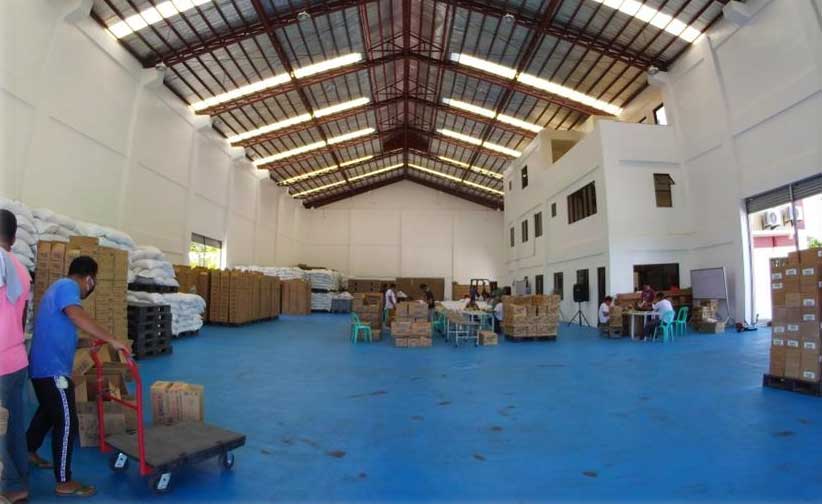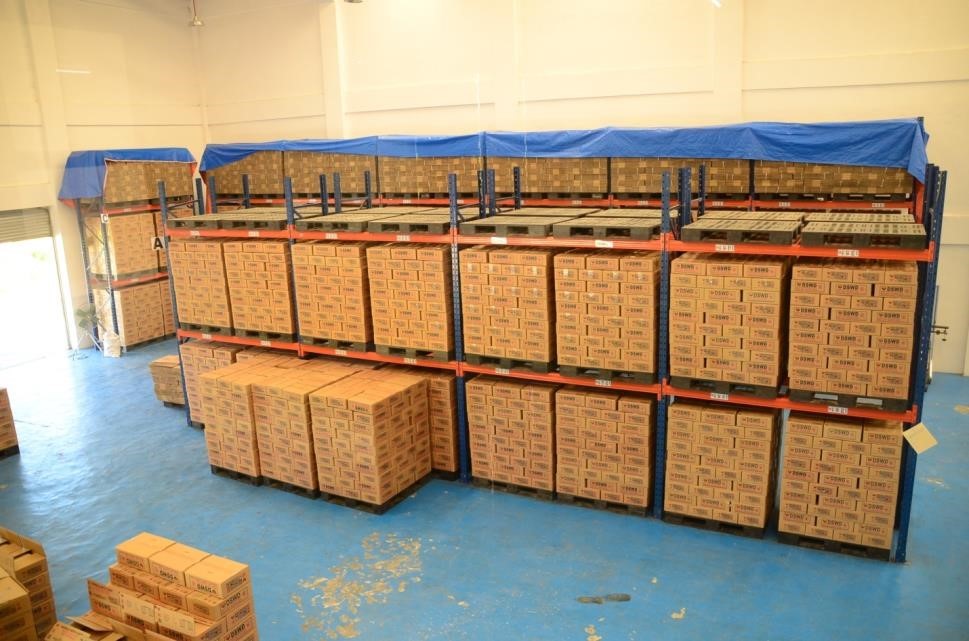Name of the Organization
Department of Social Welfare and Development Field Office VIII
Name of the Office/Unit that leads the implementation of this best practice entry
Regional Resource Operations Section (RROS) under Disaster Response Management Division (DRMD)
Focus Area of the Best Practice
Strategy, Operations, Management and Perspectives on Productivity and Quality
Date the best practice was first implemented
5 March 2018 – up to present
Summary of the Best Practice
Regional Resource Operations Section (RROS) of the Department of Social Welfare and Development (DSWD) Field Office VIII is changing the game in emergency response. Since 2018, the field office has been implementing the Family Food Packs (FFP), which introduced the following innovations:
- Transition from plastic bags to Family Food Pack boxes
- Installation of racking systems
- Use of the assembly line method and rollers
Altogether, these innovations improved how FFPs were packaged, produced, and stored and are currently being implemented at RROS.
During emergencies, especially during post-disaster response, the FFPs become a common sight to affected families, who often depend on these boxes for survival, as these boxes contain enough food to feed a family of five for two to three days.
As the chair of the Food and Non-Food Item (FNFI) Cluster of the National Disaster Risk Reduction and Management Council (NDRRMC), DSWD is responsible for the production, storage, and distribution of these FFPs. And true to its commitment, DSWD has indeed produced and distributed these relief items where they are needed–from the Yolanda-ravaged communities in 2013 to the highlands of San Jose de Buan in 2019, and even to the locked-down municipality of Burauen during the middle of the COVID-19 pandemic, FFP made a difference.
It all started when the Department of Social Welfare and Development’s RROS under the Disaster Response and Management Division (DRMD) thought of a response to DSWD’s Administrative Order 01, Series of 2018. RROS was responsible for ensuring the availability, accessibility, and readiness of resources, food and non-food items, and the administration of necessary support before and during disaster operations. The RROS is further subdivided into the Warehousing and the Donations Unit.
The Challenge
A few years ago, DSWD FO Vlll’s FFPs were packed in plastic bags. The production process needed to be more streamlined. All raw materials (canned goods, rice, coffee, etc.) would be placed on low tables. Volunteers and DSWD workers would gather around these tables, sort and place these raw materials into plastic bags marked with the DSWD logo. After repacking the food items into FFPs, these plastic bags would then be placed inside a sack and then stacked on top of pallets and on top of each other. Each sack was then marked with the production date and the expiration date. The expiration date was based on the food item with the nearest expiration date. Using this information, it became easier to plan which sacks should first be distributed.
This method required plenty of effort and was slow and exhausting. The goods were more susceptible to damage due to compression in the stacking and were not environment-friendly due to the heavy use of plastic materials.

Solution and Impact
The evolution of Family Food Pack (FFP) from plastic to carton boxes did not happen overnight. Gradual improvements had to be implemented in stages.
Stage 1: Transition from Plastic Bags to Boxes (2018)
The transition from plastic bags to boxes started in 2018 when DSWD FO VIII outsourced boxes from DSWD Field Office X, 51,777 pcs of slotted carton boxes costing Php1,967,526.0–a considerable Savings generated by the department since those were considered extra boxes of Field Office X.
Stage 2: Installation of Racking System (2018)
By mid-2018, DSWD acquired a racking system, a storage solution designed to stack materials in rows with multiple levels, which was handed over when the local branch of the International Organization for Migration (IOM) shut down its office. This paved the way to generating another savings of Php 231,034.40 for 20 sets of racks. Resulting in easier storing of relief items, protecting contents from stacking pressure and extra storage space available for more FFPs and raw materials.
Innovation
Stage 3: Assembly Line Method and Rollers (2018-2019)
Taking inspiration from the National Resource Operations Center (NROC) in NCR and Visayas Disaster Resource Center (VDRC) in Cebu, RROS implemented an assembly line method.
Using this method, repackers would stand alongside the table, FFPs would be pushed from one end of the table to the other, making small stops along the way and sealed by taping the boxes.
This streamlined system sped up the process and more FFPs were produced. However, this method had one challenge as this entails more effort in pushing the boxes along the table.
RROS devised an alternative solution through recycling materials (PVC Pipes, ball bearings, found steel, nuts/bolts) to create a fully functional Do-It-Yourself (D.I.Y) roller system. This effectively reduced strain on the part of the repackers, making the process smoother.
Performance and Results
These innovations resulted in more efficient production, storage and delivery of the FFPs, as follows:
- More environmentally-friendly. Due to the switch to boxes, DSWD was able to reduce the usage of plastic.
- Easier identification of the DSWD brand. Beneficiaries are easily able to differentiate between relief items from the LGUs and OSWO through the packaging.
- Boxes are more secure. Once sealed, beneficiaries are assured that the relief items packed at the RROS are exactly what they will receive. Boxes also prevent accidental spillage of relief items due to rough handling during relief operations.
- Easier organization and storage. The FFP box is stackable up to 100 FFPs per pallet, enabling easier storage compared to plastic bags.
- Vertical storage frees up floor space. Due to the racking system, FFPs are stored vertically increasing Storage Capacity and meeting the required minimum of 20,000 FFPs. (See Annex I)
- Faster production of FFPs. Increased number of FFPs produced in a day reaching new heights at 5000 FFPs (during Odette Relief Operations)–double the previous production figures.
Replicability
This ingenuity has already caught the attention of several DSWD Field Offices and Local Government Units.
In July 2019, RROS staff participated in the 2nd National Resource and Logistics Management
Conference held in Cebu City, where each DSWD Field Office across the country presented its Best Practices. Later that year, these innovations were also featured during DSWD NCR’s benchmarking activity, where a visit to inspect these innovations at RROS.
In 2020, RROS was invited as a resource agency by the Provincial Local Government Unit of Western Samar for the training of Municipal Social Welfare and Development Officers (MSWDOs) and Municipal Disaster Risk Reduction and Management Officers (MDRRMOs), imparting these best practices, encouraging them to replicate at the local level.
Insights of these innovations were also put into practice during the augmentation of the relief operations related to the Cotabato earthquakes last October 2019. RROS assisted in organizing the arrival of relief items and donations from various DSWD Field Offices and other agencies.
These innovations are incorporated in the Operations Manual for the Disaster Response Management Division, aiming to achieve full mechanization in the efficient production of FFPs and provide quality relief items for its dependents.

Milestones
Last January 2022, the good practice documentation “Nang Dahil sa Kahon†of DRMD Field Office VIII gained recognition when it was awarded as the Best Knowledge Management Initiative under the Innovation Category of the 2021 Program on Awards and Incentives for Service Excellence (PRAISE) Awards.
In July 2019, DSWD FO VIII also gained recognition when it won the Over-all Winner in Good Practice Presentation on Resource and Logistics Management during the 2nd National Resource and Logistics Management Conference held in Cebu City participated by the DSWD Field Offices across the 17 Regions in the Philippines.
RROS was also invited in 2020 as a resource agency by the Provincial Local Government Unit of Western Samar for the training of Municipal Social Welfare and Development Officers (MSWDOs) and Municipal Disaster Risk Reduction and Management Officers (MDRRMOs) from the province and imparting these best practices, encouraging them to replicate at the local level. Another LGU, the Municipal Government of Catarman, Northern Samar, is currently arranging with the RROS for the conduct of a similar training this August of 2022.
These innovations were also practiced during the relief operations for the families affected by the Cotabato earthquakes last October 2019 during the augmentation for the relief operations, providing technical assistance in organizing and proper storage of relief items and donations.
Furthermore, these innovations are continually being implemented as RROS enlarges its operations in 2019 when the new warehouse in Palo, Leyte was opened.
These new innovations are also incorporated in the Operations Manual for the Disaster Response Management Division in the pursuit of full mechanization in producing FFPs ensuring efficiency and providing quality relief items to families who depend on them after disasters.
Testimonials
The continuous improvement of the operations of RROS in producing FFPs gained positive feedback from beneficiaries who witnessed the transformation of FFPs distributed in the aftermath of typhoon Yolanda to its latest and more dignified form.
“Isa akong survivor ng bagyong Yolanda at yung bagong dating na bagyo, yung bagyong Odette. Nakatanggap ako ng relief goods mula sa DSWD Regional Office. Para sa akin, dati, di natin alam kung yung mga ipinamigay mula sa DSWD Region, di natin alam kung binawasan, dahil kapag naka-box siya, malalaman agad kapag binawasan kasi selyado siya ng packing tape.†– Nanay Lenny (Yolanda Survivor 2013 and Odette Survivor 2021)
“Ayos naman, mas maganda ko yung ngayong naka-box kasi selyado talaga siya hindi na makakasabing kulang.†– Nanay Yolanda (Yolanda Survivor 2013 and Odette Survivor 2021)
More so, the innovations applied yielded improvements of how FFPs are stored to ensure the quality and further increase the number of FFPs produced and stored through the Racking System and in speeding up the production through the Assembly Line Method and Rolling System.
“‘Yung storage dati, nilalagay lang yung paleta sa floor. Di talaga kami nakaka-storage ng marami kasi limitado lang ang lugar. Tapos ngayong may racking system na tayo, nakakapag-storage na tayo ng mas marami. Nama-maximize na natin yung lugar. Mas marami na yung goods na pwede nating i-stack at mas mabilis mag-store, mabilis bilangin at mabilis na rin ang pag-imbentaryo,†said Mark Anthony Tabones, Project Development Officer (Logistics).
